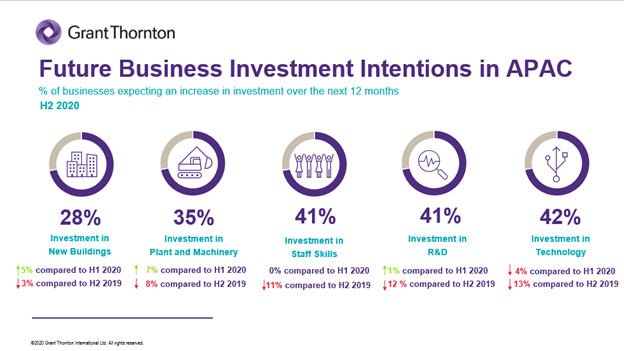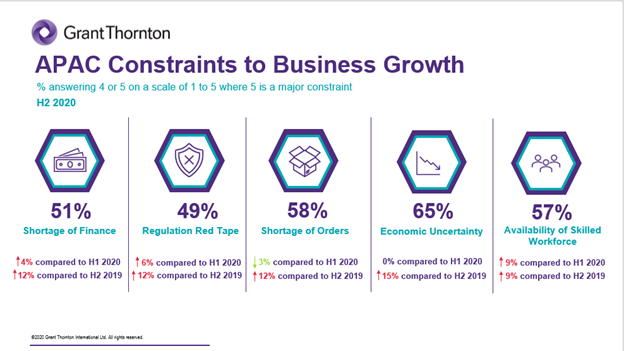-
Internal audit
In today's increasingly competitive and regulated market place, organisations - both public and private - must demonstrate that they have adequate controls and safeguards in place. The availability of qualified internal audit resources is a common challenge for many organisations.
-
IFRS
At Grant Thornton, our International Financial Reporting Standards (IFRS) advisers can help you navigate the complexity of financial reporting so you can focus your time and effort on running your business.
-
Audit quality monitoring
Having a robust process of quality control is one of the most effective ways to guarantee we deliver high-quality services to our clients.
-
Global audit technology
We apply our global audit methodology through an integrated set of software tools known as the Voyager suite.
-
Looking for permanent staff
Grant Thornton's executive recruitment is the real executive search and headhunting firms in Thailand.
-
Looking for interim executives
Interim executives are fixed-term-contract employees. Grant Thornton's specialist Executive Recruitment team can help you meet your interim executive needs
-
Looking for permanent or interim job
You may be in another job already but are willing to consider a career move should the right position at the right company become available. Or you may not be working at the moment and would like to hear from us when a relevant job comes up.
-
Practice areas
We provide retained recruitment services to multinational, Thai and Japanese organisations that are looking to fill management positions and senior level roles in Thailand.
-
Submit your resume
Executive recruitment portal
-
Update your resume
Executive recruitment portal
-
Available positions
Available positions for executive recruitment portal
-
General intelligence assessments
The Applied Reasoning Test (ART) is a general intelligence assessment that enables you to assess the level of verbal, numerical reasoning and problem solving capabilities of job candidates in a reliable and job-related manner.
-
Candidate background checks
We provide background checks and employee screening services to help our clients keep their organisation safe and profitable by protecting against the numerous pitfalls caused by unqualified, unethical, dangerous or criminal employees.

-
Capital markets
If you’re buying or selling financial securities, you want corporate finance specialists experienced in international capital markets on your side.
-
Corporate simplification
Corporate simplification
-
Expert witness
Expert witness
-
Family office services
Family office services
-
Financial models
Financial models
-
Forensic Advisory
Investigations
-
Independent business review
Does your company need a health check? Grant Thornton’s expert team can help you get to the heart of your issues to drive sustainable growth.
-
Mergers & acquisitions
Mergers & acquisitions
-
Operational advisory
Grant Thornton’s operational advisory specialists can help you realise your full potential for growth.
-
Raising finance
Raising finance
-
Restructuring & Reorganisation
Grant Thornton can help with financial restructuring and turnaround projects, including managing stakeholders and developing platforms for growth.
-
Risk management
Risk management
-
Technology & Digital Services
Technology Services
-
Transaction advisory
Transaction advisory
-
Valuations
Valuations
-
Human Capital Consulting
From time to time, companies find themselves looking for temporary accounting resources. Often this is because of staff leaving, pressures at month-end and quarter-end, or specific short-term projects the company is undertaking.
-
Strategy & Business Model
Strategy & Business Model
-
Process Optimisation & Finance Transformation
Process Optimisation & Finance Transformation
-
System & Technology
System & Technology
-
Digital Transformation
Digital Transformation
-
International tax
With experts working in more than 130 countries, Grant Thornton can help you navigate complex tax laws across multiple jurisdictions.
-
Licensing and incentives application services
Licensing and incentives application services
-
Transfer pricing
If your company operates in more than one country, transfer pricing affects you. Grant Thornton’s experts can help you manage this complex and critical area.
-
Global mobility services
Employing foreign people in Australia, or sending Australian people offshore, both add complexity to your tax obligations and benefits – and we can guide you through them.
-
Tax compliance and tax due diligence review services
Tax compliance
-
Value-Added Tax
Value-Added Tax
-
Customs and Trade
Customs and Trade
-
Service Line
グラントソントン・タイランド サービスライン
-
Business Process Outsourcing
Companies, large and small, need to focus on core activities. Still, non-core activities are important, and they need to be leaner and more efficient than most companies can make them sustainably. For Grant Thornton, your non-core activities are our core business. Grant Thornton’s experienced outsourcing team helps companies ensure resilience, improve performance, manage costs, and enhance agility in resourcing and skills. Who better to do this than an organisation with 73,000 accountants? At Grant Thornton we recognise that that outsourcing your F&A functions is a strategic decision and an extension of your brand. This means we take your business as seriously as we take our own.
-
Technology and Robotics
We provide practical digital transformation solutions anchored in business issues and opportunities. Our approach is not from technology but from business. We are particularly adept at assessing and implementing fast and iterative digital interventions which can drive high value in low complex environments. Using digital solutions, we help clients create new business value, drive efficiencies in existing processes and prepare for strategic events like mergers. We implement solutions to refresh value and create sustainable change. Our solutions help clients drive better and more insightful decisions through analytics, automate processes and make the most of artificial intelligence and machine learning. Wherever possible we will leverage your existing technologies as our interest is in solving your business problems – not in selling you more software and hardware.
-
Technical Accounting Solutions
The finance function is an essential part of the organisation and chief financial officer (CFO) being the leader has the responsibility to ensure financial discipline, compliance, and internal controls. As the finance function is critical in every phase of a company’s growth, the CFO role also demands attention in defining business strategy, mitigating risks, and mentoring the leadership. We offer technical accounting services to finance leaders to help them navigate complex financial and regulatory environments, such as financial reporting and accounting standards, managing compliance requirements, and event-based accounting such as dissolutions, mergers and acquisitions.
-
Accounting Services
Whether you are a local Thai company or a multinational company with a branch or head office in Thailand you are obliged to keep accounts and arrange for a qualified bookkeeper to keep and prepare accounts in accordance with accounting standards. This can be time consuming and even a little dauting making sure you conform with all the regulatory requirements in Thailand and using Thai language. We offer you complete peace of mind by looking after all your statutory accounting requirements. You will have a single point of contact to work with in our team who will be responsible for your accounts – no matter small or large. We also have one of the largest teams of Xero Certified Advisors in Thailand ensuring your accounts are maintained in a cloud-based system that you have access to too.
-
Staff Augmentation
We offer Staff Augmentation services where our staff, under the direction and supervision of the company’s officers, perform accounting and accounting-related work.
-
Payroll Services
More and more companies are beginning to realize the benefits of outsourcing their noncore activities, and the first to be outsourced is usually the payroll function. Payroll is easy to carve out from the rest of the business since it is usually independent of the other activities or functions within the Accounting Department. At Grant Thornton employees can gain access to their salary information and statutory filings through a specialised App on their phone. This cuts down dramatically on requests to HR for information by the employees and increases employee satisfaction. We also have an optional leave approval app too if required.
-
 IBR Optimism of Thailand Mid-Market Leaders Suggests Potential Underestimation of Challenges Ahead: International Business Report, Q1 2024Bangkok, Thailand, April 2024 — The Grant Thornton International Business Report (IBR) for Q1 2024 unveils a strikingly optimistic outlook among Thailand's mid-market business leaders, juxtaposed with the looming challenges that will shape the nation's economic future. With a Business Health Index score of 13.5, Thailand outperforms its ASEAN, Asia-Pacific, and global counterparts, signaling a robust confidence that may overshadow critical issues such as demographic changes, skills shortages, and the necessity for digital advancement.
IBR Optimism of Thailand Mid-Market Leaders Suggests Potential Underestimation of Challenges Ahead: International Business Report, Q1 2024Bangkok, Thailand, April 2024 — The Grant Thornton International Business Report (IBR) for Q1 2024 unveils a strikingly optimistic outlook among Thailand's mid-market business leaders, juxtaposed with the looming challenges that will shape the nation's economic future. With a Business Health Index score of 13.5, Thailand outperforms its ASEAN, Asia-Pacific, and global counterparts, signaling a robust confidence that may overshadow critical issues such as demographic changes, skills shortages, and the necessity for digital advancement. -
 Workshop Corporate Strategy and Company Health Check WorkshopThroughout this workshop, we will delve into the life cycle of companies, examining the stages of growth, maturity, and adaptation. Our focus will extend to the current business environment, where your Company stands today, and how our evolving strategy aligns with the ever-changing market dynamics.
Workshop Corporate Strategy and Company Health Check WorkshopThroughout this workshop, we will delve into the life cycle of companies, examining the stages of growth, maturity, and adaptation. Our focus will extend to the current business environment, where your Company stands today, and how our evolving strategy aligns with the ever-changing market dynamics. -
 Tax and Legal update 1/2024 Introducing the New “Easy E-Receipt” Tax scheme with up to THB 50,000 in Tax DeductionsThe Revenue Department has introduced the latest tax scheme, the “Easy E-Receipt”, formerly known as “Shop Dee Mee Kuen”. This scheme is designed to offer individuals tax deductions in 2024.
Tax and Legal update 1/2024 Introducing the New “Easy E-Receipt” Tax scheme with up to THB 50,000 in Tax DeductionsThe Revenue Department has introduced the latest tax scheme, the “Easy E-Receipt”, formerly known as “Shop Dee Mee Kuen”. This scheme is designed to offer individuals tax deductions in 2024. -
 TAX AND LEGAL Complying with the PDPA – A Balancing ActOrganisations must be aware of the circumstances in which they are allowed to collect data to comply with Thailand’s Personal Data Protection Act.
TAX AND LEGAL Complying with the PDPA – A Balancing ActOrganisations must be aware of the circumstances in which they are allowed to collect data to comply with Thailand’s Personal Data Protection Act.
This is Part 3 of a series on Grant Thornton’s global research for H2 2020. Part 1 introduces the report and provides a framework for interpreting the data, while Part 2 summarises the main findings at a global level.
Grant Thornton’s global research reveals that the business confidence among company leaders in APAC stands at 62%, a remarkably high total for a region that has been badly affected by the slowdown in international travel. This total is 6 percentage points higher than in H2 2019, and a full 15 percentage points above H1 2020 levels. The high level of confidence is especially notable because the same group of respondents also predicted a worsening of several key business constraints over the coming 12-month period.
Grant Thornton’s global research measures business sentiment among chief executive officers, managing directors, chairpersons, or other senior executives from all industry sectors. For each country included in the survey, a minimum of 50 respondents are interviewed for the report.
Obstacles in the path – but also the confidence to overcome them
As we see in the chart below, the business confidence among survey respondents in H2 2020 stands out in contrast to other indicators highlighted in the same survey.

Predictions about tangible quantities such as revenue and profitability, for example, seem to trail behind the more abstract term of business confidence.
Likewise, the next chart gives little support for the buoyant levels of optimism expressed by survey respondents:

A closer look at the numbers, however, yields interesting findings about business strategy moving forward. The expected increases in investment toward new buildings as well as plant and machinery may not lead to immediate profit, but could very well set the stage for better performance further down the road. With short-term sales continuing to face headwinds amid the struggling world economy, such forward-looking strategies may represent the most sensible remaining strategy.
Support for this analysis comes from the report’s other top-level data, which shows continuing challenges in a number of categories – including a shortage of finance as well as general economic uncertainty. The chart below shows that overall, the only major constraint expected to become less severe pertains to the quantity of customer orders. Survey respondents expect most other key challenges to get worse before they get better:

These ongoing challenges, including regulatory hurdles and a shortage of skilled workers, highlight the need for businesses across APAC to make special tactical adaptations as they push forward during this transformational economic period. From specific adjustments and upgrades – such as advanced recruitment methods for key positions – to the all-purpose flexibility made possible by agile business structures, future success will depend in large part on the ability of companies to incorporate thoroughly modern processes at the heart of their operations.
The recent increase in viral spread within certain APAC nations (including Thailand, South Korea, and Japan) indicates that, despite the promise of vaccines to come shortly, the potential remains for COVID-19 to continue to cause disruption across economies moving forward. This uncertainty provides even greater reason for businesses to embrace flexibility as a strategic ideal, rather than adopting optimism itself as a strategy and simply hoping for the best.
Part 4 of this series, covering Thailand, will follow shortly.



